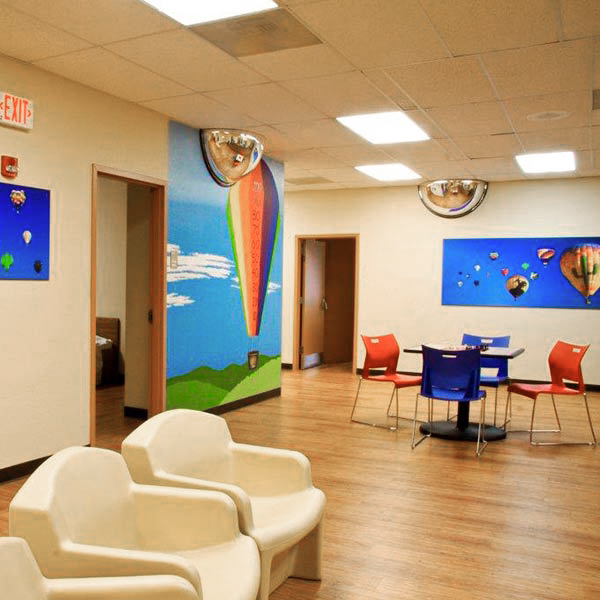Sonora Behavioral Health Hospital is dedicated to providing superior treatment to children, teens, and adults suffering from intermittent explosive disorder. Located in Tucson, Sonora provides the comprehensive care needed to successfully manage mental health disorders and lead a life of recovery.
Treatment for Intermittent Explosive Disorder
Learn More About Treatment for Intermittent Explosive Disorder
When an individual is unable to control aggressive impulses, participates in unprovoked angry and violent behavior, and frequently explodes in verbally aggressive outbursts that are grossly out of proportion to the situation/environment around him or her, it is possible that he or she is suffering from intermittent explosive disorder. Intermittent explosive disorder, also known as IED, can cause people to inadvertently destroy interpersonal relationships, fail in academic or occupational settings, and become isolated and detached from the world around them. Yet, life does not have to be this way because there is help available.
Sonora Behavioral Health is a 140-bed leading acute inpatient psychiatric hospital in Tucson designed to provide optimal treatment for children, adolescents, and adults who are struggling with intermittent explosive disorder (IED). We strive to stand out from our competitors by being the only inpatient facility in Arizona that accepts children as young as five years old. The staff at our treatment center recognizes the challenges that can come with living a life colored by the rage that defines IED and we want to show you that there is hope for the future. We want to help you develop the tools you need to manage your symptoms and move forward towards living the life you want to live.
Helping a Loved One
Helping a Loved One or Family Member Get Treatment
Having a family member or loved one with intermittent explosive disorder can be angering, frustrating, and even frightening. You may feel as though you have to be especially careful around your loved one at all times because you never know how he or she will react to various situations. You may be worried about your loved one’s future because you are watching so many different aspects of his or her life seeming to spiral out of control. At times, you may simply feel aggravated because you do not understand why your loved one cannot control his or her behaviors. You know that your loved one needs help, but you are not sure how to go about presenting him or her with the idea because you are fearful of what the reaction will be. Here are some things to keep in mind when approaching your loved one:
- Educate yourself about IED – the more that you understand about this disorder, the easier it will be to empathize with what your loved one is going through
- Research possible treatment options that will best meet your loved one’s needs
- Refrain from being judgmental and try to remain patient
- Anticipate that your loved one’s initial reaction to the mention of getting treatment may be a negative one, but continue to stress the importance of doing so
- Do not minimize his or her feelings
- Do not make excuses for your loved one and his or her behaviors
- Remain a source of unconditional support – offer to go with him or her to any appointments that are scheduled and continue to encourage your loved one as he or she progresses through treatment
Why Choose Us
Why Consider Treatment at Sonora Behavioral Health
Living with the symptoms and effects of intermittent explosive disorder can be devastating to the lives on those who are suffering from the disorder as well as on the lives of those around them. Children and adolescents may experience significant problems in school as they lose control over their impulses and initiate verbal and physical fights, resulting in getting suspended or expelled. Adults may find that their symptoms have caused immense disruption in their ability to perform appropriately at work, even possibly leading to unemployment. The extent of the negative consequences that untreated IED can have on a person is far-reaching. In order to prevent those consequences from becoming a reality, it is important that individuals with IED seek out treatment.
Seeking care at inpatient treatment centers can be beneficial at helping individuals who are struggling with intermittent explosive disorder overcome their behaviors and move towards a happier, healthier way of functioning. By taking part in this type of program, people are able to walk away from the stressors of their everyday lives and immerse themselves in an environment where their only job is to focus on becoming well again. Through the implementation of a variety of therapeutic techniques, inpatient treatment programs can help individuals develop the skills they need to overcome their aggressive impulses and learn how to manage their emotions in a positive, healthy way.
Philosophy & Benefits
Intermittent Explosive Disorder Treatment Philosophy and Benefits
As the leading psychiatric treatment center in Tucson, we have made it our sole mission to provide superior behavioral healthcare services to the people, hospitals, and communities that we serve. By employing an evidenced-based treatment protocol that teaches effective coping skills, we are able to enhance our patients’ ability to remain successful after they are discharged from our care. Our highly trained and qualified staff is dedicated to providing comprehensive medical and psychiatric assessments, diagnostic services, and thorough treatment. By caring for patients who are struggling with acute illnesses in a sensitive and caring manner, the staff at Sonora is able to assist those who come to us for help regain and maintain their highest level of functioning.
Types of Treatment
Types of Treatment Offered at Sonora Behavioral Health Hospital
Upon arrival at our treatment center, each patient will complete an initial assessment that will include a physical examination, a collection of medical history, a psychiatric evaluation, and a psychological assessment. During this time, we will also identify social skills, cultural and family issues, and determine any other needs that each patient may have. We use a multidisciplinary approach to treatment, and our experienced clinical team is composed of psychiatrists, internists, psychiatric nurses, social workers, therapists, and expressive art therapists, all of whom are trained in treating individuals struggling with emotional health and substance abuse concerns. All treatment plans are individualized and include the following methods:
Medication management: Depending upon the severity of one’s symptoms, as well as the possible presence of any substance abuse concerns or co-occurring disorders, medication may be prescribed. All patients are seen daily by a psychiatrist to ensure the effectiveness of any medications that are being taken, as well as to make any changes that might be necessary. Additionally, all patients receive individual medication education in order to address any questions or concerns that may arise.
Group therapy: At our treatment center, our main form of treatment is daily group therapy sessions. Rather than using process groups like many inpatient treatment programs do, we instead use solution-focused groups that teach patients a variety of skills needed to overcome their anxiety. Some of our group topics include coping skills, stress management, self-awareness, relaxation, and self-help skills training.
Family meetings: Family members are encouraged to be an active part of all aspects of the treatment process. Education about their loved one’s condition is provided and family members are in constant communication with case managers throughout their loved one’s stay.
Additional treatment methods may include the following:
- Recreation therapy
- Expressive therapy, including art therapy
- Weekly dietary groups
- Daily meetings with a social worker
Continuing Care
Continuing Care and Levels of Treatment
The discharge planning process begins as soon as a patient is admitted to our hospital. Within 48 hours of admission, a social worker will evaluate each patient for available resources that can be implemented once he or she has left our center, including placement, transportation, and aftercare treatment. When the time comes for the patient to be discharged, the social worker will coordinate placement with the patient, the patient’s family members, any outside community agencies in Tucson or elsewhere, or private insurance. If needed, social workers will also coordinate transportation from the hospital to the patient’s next placement on the day of discharge, as well as ensure that transportation needs for aftercare treatment appointments are met.
For adult patients that no longer require the intensive level of psychiatric care provided by inpatient treatment, our psychiatric hospital offers outpatient treatment that consist of nine to twelve hours of group therapy each week. These groups allow participants to process real-life scenarios as they happen, while also receiving the support they need as they practice the new techniques that they are learning. This eight to twelve week period of intensive treatment gives participants the chance to use a group setting to work through the emotional and psychological issues that have kept them locked in a state of distress. Through our outpatient treatment, patients will learn techniques that they can continue to use for the rest of their lives.
Our partial hospitalization program (PHP) and our intensive outpatient program (IOP) allow patients to live at home, attend school, or go back to work while still receiving the treatment that they need. PHP is held 5 days a week for 6 hours each day, while IOP is held 3 days a week for 3 hours each day. Both programs have a mental health and chemical dependency track. In addition to PHP and IOP, we have an aftercare program for alumni held monthly for as long as the patient needs.














